Bravely Facing Truth
On History, Heroes, and What's Possible
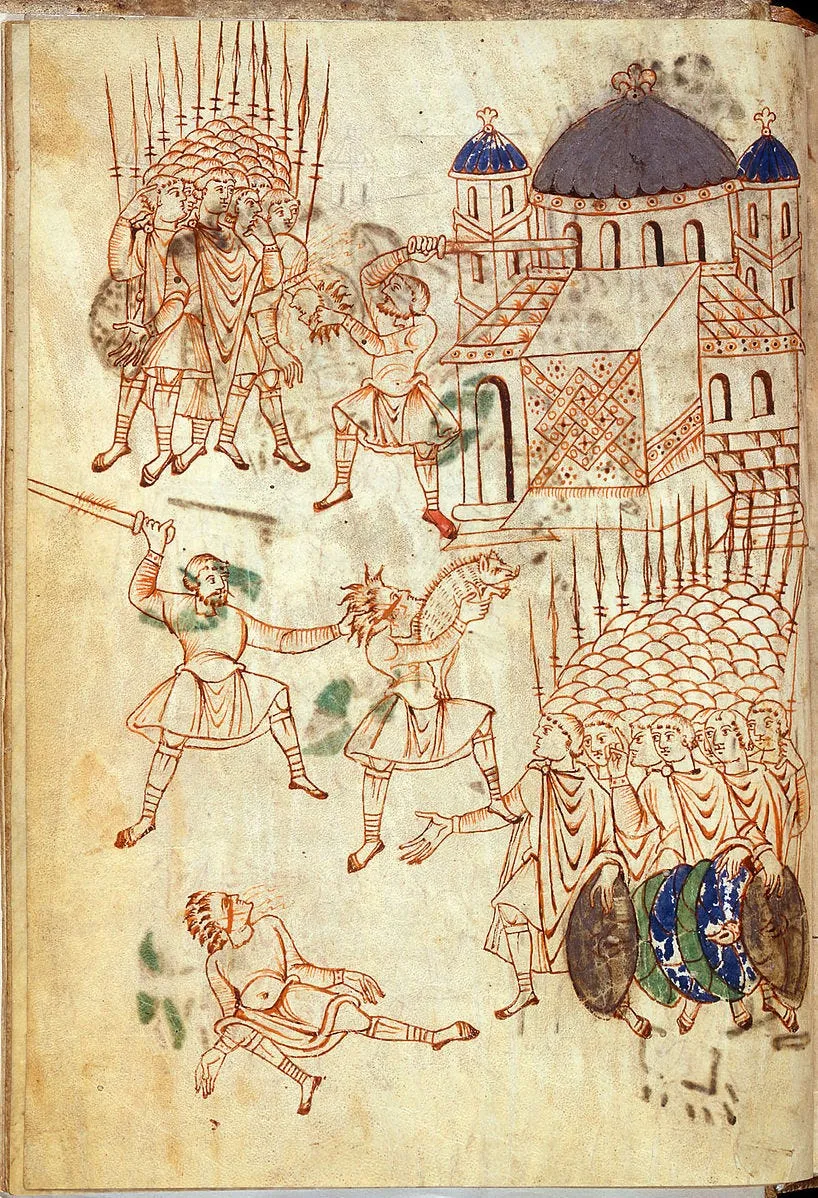
This is Life as a Sacred Text, an expansive, loving, everybody-celebrating, nobody-diminished, justice-centered voyage into one of the world’s most ancient and holy books. More about the project here, and to subscribe for free (or not), go here.🌱
In the past, I’ve talked about Hanukah and adult faith—about how to engage with the power and magic of this time—and possibilities for spiritual connection—that transcend the ways in which the original Hanukah story went down.
The Maccabees’ story is about war, and it’s not an ethically uncomplicated one. There, I write,
“Part of adult faith is being able to look truth in the eye, to take responsibility for it, and to not get stuck by the fact that it's not an easy story.”
I certainly feel like this message is important and relevant now, more than ever.
What happens after that—on the other side of getting stuck? That’s the subject of that piece (linked right here). But this year, I think it’s time to do a deeper dive into looking truth in the eye.
These are my personal opinions, not those of my employer or of anyone else. They are also not the entirety of my personal opinions. There are a lot of other things I think that are not reflected here. I’m really tired right now, y’all. It’s been a lot these last many long days. I’m sure everybody’s gonna be angry that I’m not representing something fairly or clearly enough. Please do not yell. This is important and so much is at stake here, and so many of us are carrying so, so much love and care and also trauma into this conversation—processed or not, epigenetic or not. We are all trying our best to try to feel our way towards a more whole world: One that honors all of our inherent dignity. One that has enough for everyone, is safe for everyone, gives care to everyone. We are all doing our best. (Reminder that if it’s bold, it’s probably a hyperlink.)
I will be candid:
I’m wary about writing about this, but I also feel a responsibility to write about this. The history of Hanukah involves Jews waging war in the Land of Israel—there will be a lot of people with a lot of takes. One of mine is linked, above. I hold by that one, too.
I just… this can’t be the year that I elide the hard stuff about the Maccabees’ war, or any war, with metaphors, you know?
This can’t be the year it gets sidestepped.
Israel has bombed Jabalya refugee camp, and they’ve expanded ground operations. They are sending people to evacuate and then bombing the evacuation routes. So far, the bombing has killed more than 16,200 human souls, each holy, irreplaceable, created in the divine image.
In the West Bank, more Palestinians have been killed than in any year since 2005—over 220 people in less than 2 months. Settler violence is so bad that over sixteen Palestinian communities have been driven out of their homes since Oct 7th for fear of their safety.
Bibi Netanyahu has already been indicted on counts of fraud, bribery and corruption. He knows that he is likely ousted the moment Israel goes out of crisis mode.
If this war ever ends he’ll have to face the rage of people in a country about the size and population of New Jersey for propping up Hamas for years—including enabling money to come in from Qatar to fund the massacre and the kidnappings that began this chapter of horror.
Remember that judicial overhaul that Israelis protested for 40 weeks straight? That whole thing was to weaken the judicial branch in order to -- ultimately-- disappear his legal troubles. If he’s ousted before he gets to finish all that corruption? Welp.
He’s also appeasing the more genocidal factions of his government, who have threatened to bounce from his coalition if he doesn’t continue the war.
There are a lot of pieces of this (but one of them is that an amoral, panicked man is going scorched earth on an entire population of human beings as an attempt to keep evading the consequences of his actions. It’s a little hard to comprehend.
Now let’s get into the Wayback Machine. First we’re going to go over some of the basics of the Hanukah history. And then we’ll look especially at Maccabee fellas.
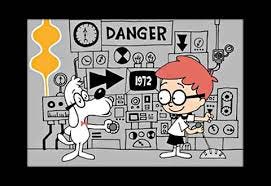
So. We know that there was a big move of Hellenization in Judaism, right? We remember that? Alexander the Great conquered Judea in 332 BCE. And he brought Greek culture, language, all that stuff with him.
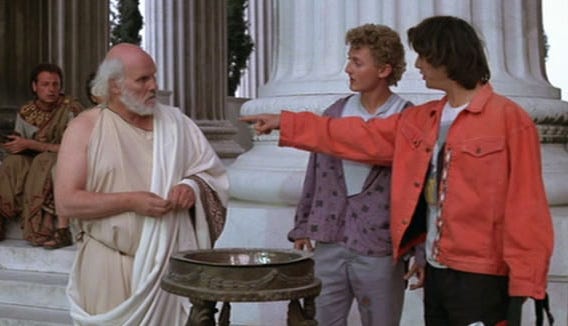
In this world, the Judean who wanted to advance socially learned Greek and worked for the Greek government. Texts mashed up Jewish theology and Greek concepts, like Ben Sira. Hellenistic ways, from school to a deanthropomorphized deity also became integrated into the Judean framework.
And then things changed.
Antiochus IV took the the Selucid (aka Syrian-Greek) throne in 175 B.C.E.1
He was a corrupt, insecure, narcissistic, wealth-flaunting little despot who was perfectly happy to pocket a fat bribe and give the High Priesthood to Jason (né Yeshua2), instead of Jason’s older brother, Onias III, the legitimate heir to the position.
Onias III and Jason were both descendants of Zadok, High Priest in the time of King David—but Jason was more of a Hellenizer (hence using the Greek name).
But there was precedent now for buying the High Priesthood, and so, a couple of years later, another priest named Menelaus—not at all connected to this 900 year-old Zadokian line—outbid Jason for the gig and shortly thereafter arranged for Onias III’s murder. He was an extreme Hellenizer.
Onias IV fled to Egypt; the traditional priestly line was, from there, more or less kaput.3
Around this time, Antiochus IV comes back from a humiliating failed attempt to take Egypt and
“write[s] to his whole kingdom that all should be one people, and that all should give up their particular customs.” (I Maccabees 1:42-42) 4
He not only forbade circumcision and Shabbat observance, but mandated sacrifice to Greek gods—abolishing Judaism in a Judaea. Notably, Menelaus and his Super Hellenizer (Jewish) buds were perfectly down with enforcing this.
To this, the Judean had only two possible responses: violate traditional laws and be complicit, or rebel and be killed.
In II Maccabees 6, an old man not only refuses to eat pork at a Dionysian festival, but declines to feign eating as well:
Those in charge of the sacrifice had been friends of Eleazar for a long time, and because of this friendship they told him privately to bring meat that was lawful for him to eat. He need only pretend to eat the pork, they said, and in this way he would not be put to death.
Just quietly nosh some goat jerky and nobody will be the wiser! But Eleazar wasn’t having it. He replied:
“If I pretended to eat this meat, just to live a little while longer, it would bring shame and disgrace on me and lead many young people astray. For the present I might be able to escape what you could do to me, but whether I live or die, I cannot escape God.”5
Do you think Eleazar’s buddies were cool with this moment of religious pluralism? Make room for his observance in that space and all?
As soon as he said these things, he was dragged off to be tortured, and the very people who had treated him kindly a few minutes before, now turned against him….
So: not.
The attempt to save Judaism and one’s own life had become, in this sense, a choice.
The middle ground vanished.

This impacted theology.
All the way back during the Babylonian exile (ca 586 BCE), when all Israelites were similarly oppressed, prophets like Second Isaiah, Jeremiah and Ezekiel discussed the kingdom after death as one of communal responsibility.
The individual was urged to reform to help the whole: Isaiah 26:2 cries,
Open the gates [of salvation], and let a righteous nation enter; [A nation] that keeps faith.
If the totality of people are below God’s standard of righteousness, there is to be no reward in the World to Come for, like, anybody.
The individual had an enormous responsibility to the collective.
This changed during the reign of Antiochus IV. At this point, an eschatology—uh, theology of life after death—began to emerge that was purely individualistic in nature.
Daniel writes that at the final judgment the dead shall rise,
“some to everlasting life and some to shame and everlasting contempt.” (Daniel 12: 2)
Each Judean had to choose a side, and if they chose poorly, they would be punished forever.
The fact that it’s possible (likely) that this genre was developed by the Hasid, or ‘pious’ group6 brings things into even clearer focus: Those who resist Hellenization will find the kingdom of God, those who do not will suffer.7
Under the persecution of Antiochus IV/Menelaus, martyrdom was rampant. Some were murdered for circumcising their sons, others were burned alive for observing the Sabbath. (II Maccabees 6:10-11) II Maccabees 7 describes a mother who encourages her seven sons to refuse to eat pork, even as she watches the Selucids torture and dismember them one by one. She proclaims that
“we are ready to die rather than transgress the laws of our ancestors.” (II Maccabees 7:2)
In a time when neighbors were taking different stands and, eventually, fighting on different sides of civil war, there was neither room for a communal ethic nor openness to differing ideologies.
(Gosh, isn’t it great that history lessons offer us such a lovely break from the headaches of our contemporary moment? Mmmm.)
And then there’s this:
The Hasmonean (Maccabean) military, after rousting the Selucids, conquered nearby Idumaea in 128 B.C.E. and Ituraea in 104/3 B.C.E.
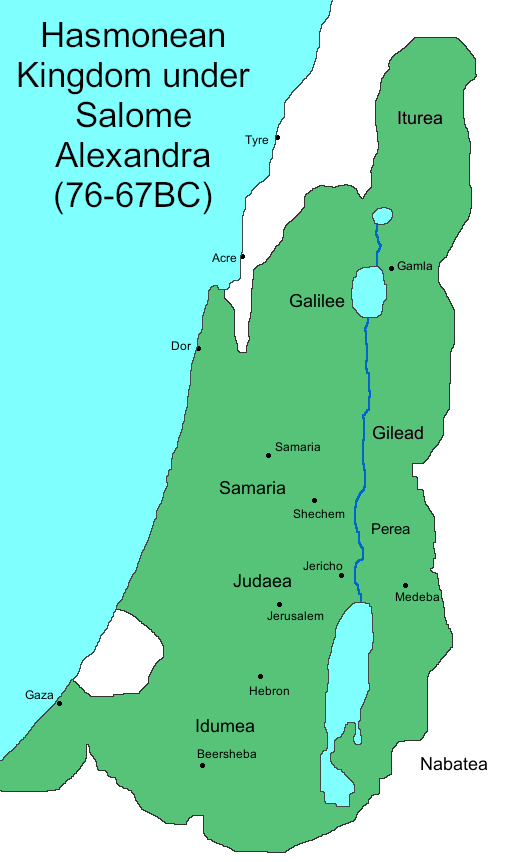
In the end, the Idumeans and Itureans declared allegiance to the Judean government and began to observe the laws of their rulers. They also began to practice circumcision if they had not been doing so at the time of conquest.
This coercion, or even encouragement, of non-Judeans to adopt the Judean way of life was unprecedented.
Professor Shaye Cohen, a foremost scholar in this area, argues that the Idumean and Iturean conquest and conversion found its model in the Greek state. That is, just as fluency in Greek and immersion into Greek culture became the means of Hellenization, so too did adherence to the Judean way of life allow non-Judeans to become ‘Jewish.’
Got it? Judeans appropriated contemporary models of supremacy to prove themselves as a political and military force.
Yet it did so rigidly; while Hellenism generally afforded benefits to those who chose it, the Maccabees may have threatened their new subjects with expulsion if they did not adopt the Judean laws.
In this sense, their policy resembled more the few years that they lived under Antiochus IV than the Hellenisms which reigned in Judaea for the 150 years preceding.
The Judean government was to expand their borders, but differences in culture were likely construed as a threat; the last time Judeans allowed integration into another society, their children were slaughtered for observing Shabbat. (II Maccabees 6:10-11)
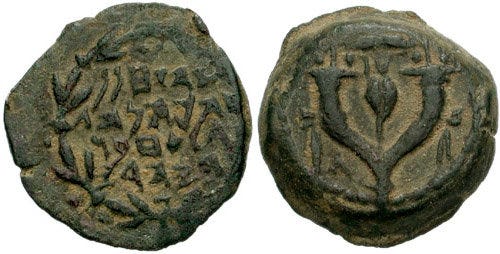
OK. So we’ve got the Selucids and their oppression. We’ve got a lot of war and conquering and some conversion that happened with sketchy-at-best consent. Then there’s the political corruption:
After the Maccabean revolt and some additional political maneuvering, Jonathan Maccabaeus, a priest but (yet again) not a legitimate descendent of the line of Zadok—became the High Priest. This was regarded by traditionalists—the ones who were on board with ditching the Hellenists up until now—as an illegal seizure of power.
The corruption of traditional lineage did a lot to damage the Hasmonean (aka Maccabee Family And Friends) claim to legitimacy. Though they fought Antiochus IV’s attempt to damage Judaism, the new government abandoned the ancestry of an office that was almost nine hundred years old.9
Heard of the Dead Sea Scrolls? Those belonged to a separatist community of Qumran, an area in the West Bank near the Dead Sea.
A lot of the community’s core texts go on and on about a Wicked Priest who
abolish[ed] the ways of righteousness and remove[d] the boundary with which [Israel’s] forefathers had marked out their inheritance. (Damascus Document 1:3)
Especially given how many references the Scrolls contain to the Zadokian lineage, many scholars believe that the Wicked Priest is Jonathan Maccabeus or his son, Simon.
The Qumran community, when asked about sacred authority in Jerusalem:

So, scorecard:
✅ Judeans who rejected the Selucid cult condemned and killed those who acquiesced to it.
✅ And vice versa. Bad look all around.
✅ Theology went more individualistic: Every Jew for themselves.
✅ The Maccabees went on a conquering tear and “Juda-ized” the locals—imposing upon them the same rigid “choose or lose” dilemma that Antiochus IV had forced upon them. But Jewy.
✅ The individualism fostered during the Antiochian persecution was not eradicated with the institution of a Judean government; rather, schisms were exacerbated, extremism fomented, and corruption grew.
✅ The corruption and intergroup-fighting culminated in the Hasmonean Civil War in 67–63 BCE, which ended with the land of Israel becoming a vassal state of the Roman Empire! Great work, guys.
The State of Israel is the first time that the Jewish people have self-sovereignty in over 2000 years.
The time before that was the Hasmonean Dynasty.
It’s perhaps not surprising that early Zionists felt an affinity for the Maccabees. It was A Thing. The “new Jew” and the search for heroes. There was a Lot Of Gender involved here—a move towards a valiant, empowered “muscular Jewry” rather than the persecuted (and worse) experience of the Old World.
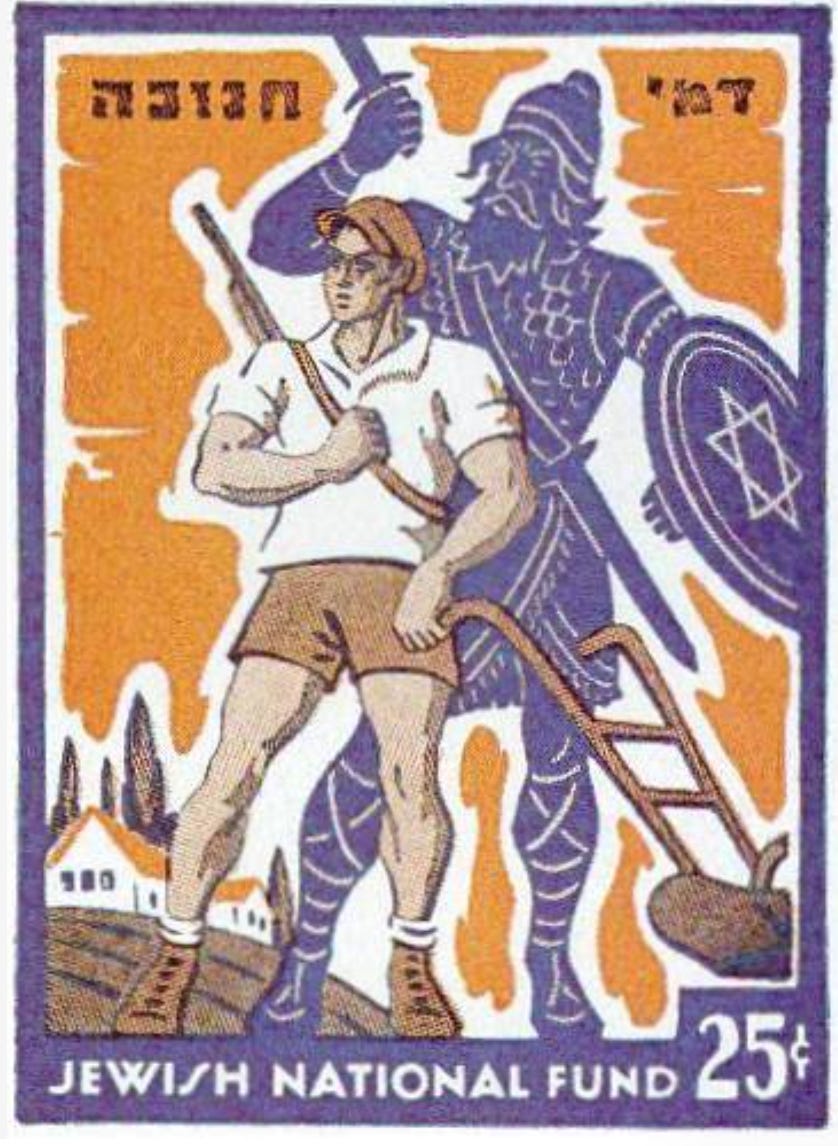
I don’t want to force analogies. I am not going to play the game wherein I map characters from then (or then, or then) onto characters from now, or anything of the sort.
But I want to say this:
If we do not look closely at our historical heroes, if we do not tell the whole truth about them, we risk—consciously or unconsciously—replicating their harms.
Like how lifting up George Washington and Thomas Jefferson uncritically reinscribes white supremacy even if the person doing so is not consciously thinking about the fact that they were enslavers. It doesn’t matter. They were enslavers, and even if telling that truth makes the Founding American Myth (tm) messier, harder to neatly arrange into a binary story of Good Patriots and Bad Redcoats—speaking that truth opens the possibility of reckoning with everything that’s happened since—and all the ways systemic racism continues to operate now.
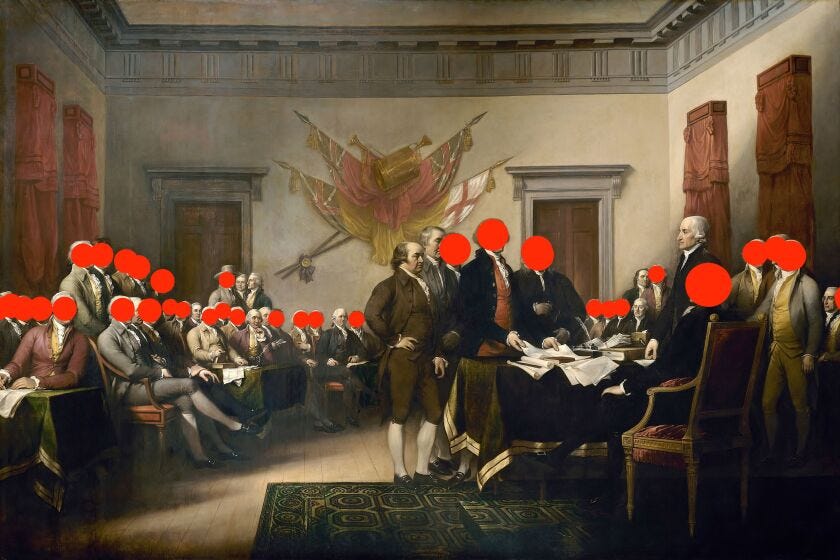
You are allowed to be glad for the American Revolution! I imagine that it was overall better that the US wasn’t a British colony until the mid-20th c. or whenever that would have gone down. (I think? Except for how Britain outlawed slavery in 1834, ahem.)10
But even being glad for an aspect of history does not mean that we should stop thinking critically about it.
I am glad the Temple was cleaned of Zeus worship and pig sacrifice and ultimately rededicated. Woulda been the end of my people’s tradition—and probably my people—without it.
A great miracle happened there, dangit!!!
But the Maccabees/Hasmoneans, traumatized by so much of what had gone down, evidently didn’t pause for EMDR or other therapeutic interventions before taking their next steps.
It was hard, that moment in history—I see that! But we should nonetheless be wary of One Right Way thinking, of so much determination to go to the mat over power and purity—to go to war, to break away, to go from thinking about the collective to thinking about me, me, me.
It’s dangerous to hold these guys up as heroes without being thoughtful about which parts of their story we want to cite as heroic and which parts, not so much.
There are no perfect stories. Not when history and facts are involved.
Human beings are going to human being, and we are often messy and complicated and very infrequently do we live up to the ideals that we are supposed to embody. We know this.
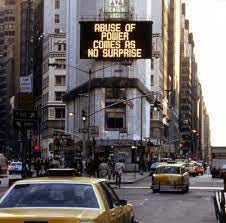
But the spiritual path—the one to which all our holy days point, including Hanukah—is about finding the north star of those ideals.
It’s about saying: Here’s what we are, what we can be for, here’s how we can aim to transcend the lazy, selfish parts of ourselves. The parts of ourselves that seek power at others’ expense. The parts of ourselves that look out for number one instead of reaching out to everyone being harmed. The parts of ourselves driven by fear, not by true courage—true valor.
Hanukah isn’t just about what happened in the past, on the calendar.
It’s about who we are capable of being.
It’s about the bravery, will and determination to reject tyranny.
It’s about the survival of the Jewish tradition, the protection of what is most holy to us.
If so, perhaps we can remember what lives in our Holy of Holies now, 2000 years since we’ve had the physical space:
·We are all, our Torah teaches, created in the divine image. All of us. Every last one of us. Not a single one of us disposable, not a single person replaceable, no "collateral damage" not unconscionable.
The sage Hillel taught (Talmud Shabbat 31a) that the thing can be summed up as, "That which is hateful to you do not do to another; that is the entire Torah, and the rest is its interpretation. Go study."
Then there’s the center verse in the Torah, the actual literary core of the thing— which Rabbi Akiva (in Sifra Kedoshim 4:12) claims is the “great principle” of the Torah: "You shall love your neighbor as yourself" (Lev 19:18).
There’s his buddy Ben Azzai who says, in the same text, no, my friend, the great principle is actually Genesis 5:1: "This is the numeration of the generations of Adam." That is to say--remembering, knowing that every single human being alive right now is descended from a common ancestor.
Maybe this year, this Hanukah, we can rededicate all that has been defiled to these essential truths. Hold them close.
Maybe this year, the radical act of bravery and valor can include undoing some of the Maccabees’ binary thinking, remembering that we must know who we are—but that when we hold ourselves in too brittle a way, we splinter—and/or hurt others.
Maybe this year, instead of making the same kinds of mistakes, we can learn from Hasmonean history and create a possibility for a world in which we can both hold ourselves, and also make space for others.
And I reckon that that is the miracle we most desperately need right now. ✨
🌱
Like this? Get more of it in your inbox every week.
For free every Monday—sign up at the ‘Subscribe now’ button just below.
And if you become a paid subscriber, that's how you can get tools for deeper transformation, a community for doing the work, and support the labor that makes these Monday essays happen.
A note on the subscription model:
I want my work to be as accessible to as many people as possible, in as many ways as possible. That's why the Monday essays are free, and why we donate subscriptions to anyone for whom paying is a barrier to the House of Study posts.
I also believe people should be paid fairly for their work. Needless to say, these two values sometimes seem to be in conflict, but I do what I can to find a fair balance. I offer many resources for free, and charge for others. When you donate generously or pay at the top of our scale, that helps support the work I do, provides access for those who have fewer resources, pays for the infrastructure and the technical and practical support that it takes to do this, and helps us keep the work sustainable.
And as always, if you want in to the Thursday space but paying isn't for you now, just email support@lifeisasacredtext.com and we'll hook you up.
And if you’d like to underwrite one of these donated subscriptions, you can do so by signing up at one of the higher subscription points.
And if it resonated with you, please share this post.
Sending a big pile of blessings and goodness your way. 💕
Alex the Great died without naming a successor, after all the territory squabbles his general Seleucus I Nicator got the Middle Eastern chunk of things, hence the Selucid Empire. ↩
Y’all it was just a common name back then. ↩
Our boy Onias IV tried to start a Jewish Temple in Leontopolis, Egypt, and it lasted for a bit, but the Romans closed it down in 73 CE, after the Great Jewish War. The influence of the family eventually petered out. ↩
There are a few theories about why he suddenly showed up with an anti-Shabbos vendetta:
False rumors of his death spread; a legit rebellion against the Selucids sprang up in Judea as a result, and this was his way of putting it down.
He mistakenly thought there was a rebellion, but there wasn’t really, it was nothingburger, whoops.
Nothing happened rebellion-wise, he was just taking out his anger about the Egypt thing elsewhere. Petty, petty man.
This is not technically the origin of “take off your kippah if you go into a non-kosher restaurant, even if you’re just getting coffee, lest other people see an observant Yid in there and think that the place is kosher” principle, but it sure could be, eh? That concept is called marit ayin, I have lots to say about it, but we’ll get into it some other day. ↩
Right, this is NOT the 18th c. emergence of Hasidut/Hasidic Judaism that you’re probably thinking of. ↩
EG Eleazar of the no-goat-jerky said, in II Maccabees 6: “For the present I might be able to escape what you could do to me, but whether I live or die, I cannot escape God. If I die bravely now, it will show that I deserved my long life…God possesses all holy knowledge. God knows I could have escaped these terrible sufferings and death, yet God also knows that I gladly suffer these things, because I fear God.” I, I, I, me, me, me. ↩
Want to get even more meta? In 1932, Zionists began the The Maccabiah Games, a Jewish multi-sport tournament. So you have Hasmoneans imitating Greeks and then Zionists taking the Hasmonean name and applying it to a Greek concept (the Olympics). I think at a certain point, x = 0 ? ↩
Because yeah, they totally could have gone and fetched Onias IV from Egypt where he was just hanging out, wondering if anyone was interested in restoring a 900 year-old priestly lineage or not or what. (It’s funny that I seem to be taking his side; I’m not usually exactly one for monarchy, I’m just weirdly offended on Onias IV’s behalf, here.) ↩
Me to my spouse: “I’m now so deep into tangents on this piece that I’m asking if the American Revolution was a good idea.” My spouse: “Hey, Dolly Parton. It was worth it.” ↩
From everything written about him, evidently all are plausible. ↩
This is not technically the origin of “take off your kippah if you go into a non-kosher restaurant, even if you’re just getting coffee, lest other people see an observant Yid in there and think that the place is kosher” principle, but it sure could be, eh? That concept is called marit ayin, I have lots to say about it, but we’ll get into it some other day. ↩
Right, this is NOT the 18th c. emergence of Hasidut/Hasidic Judaism that you’re probably thinking of. ↩
EG Eleazar of the no-goat-jerky said, in II Maccabees 6: “For the present I might be able to escape what you could do to me, but whether I live or die, I cannot escape God. If I die bravely now, it will show that I deserved my long life…God possesses all holy knowledge. God knows I could have escaped these terrible sufferings and death, yet God also knows that I gladly suffer these things, because I fear God.” I, I, I, me, me, me. ↩
Want to get even more meta? In 1932, Zionists began the The Maccabiah Games, a Jewish multi-sport tournament. So you have Hasmoneans imitating Greeks and then Zionists taking the Hasmonean name and applying it to a Greek concept (the Olympics). I think at a certain point, x = 0 ? ↩
Because yeah, they totally could have gone and fetched Onias IV from Egypt where he was just hanging out, wondering if anyone was interested in restoring a 900 year-old priestly lineage or not or what. (It’s funny that I seem to be taking his side; I’m not usually exactly one for monarchy, I’m just weirdly offended on Onias IV’s behalf, here.) ↩
Me to my spouse: “I’m now so deep into tangents on this piece that I’m asking if the American Revolution was a good idea.” My spouse: “Hey, Dolly Parton. It was worth it.” ↩




